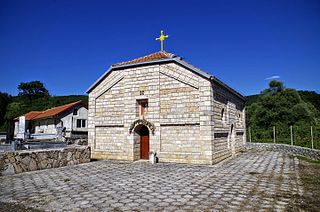
Macedonians are a nation and a South Slavic ethnic group native to the region of Macedonia in Southeast Europe. They speak Macedonian, a South Slavic language. The large majority of Macedonians identify as Eastern Orthodox Christians, who share a cultural and historical "Orthodox Byzantine–Slavic heritage" with their neighbours. About two-thirds of all ethnic Macedonians live in North Macedonia; there are also communities in a number of other countries.

The Socialist Republic of Macedonia, or SR Macedonia, commonly referred to as Socialist Macedonia, Yugoslav Macedonia or simply Macedonia, was one of the six constituent republics of the post-World War II Socialist Federal Republic of Yugoslavia, and a nation state of the Macedonians. After the transition of the political system to parliamentary democracy in 1990, the Republic changed its official name to Republic of Macedonia in 1991, and with the beginning of the breakup of Yugoslavia, it declared itself an independent country and held a referendum on 8 September 1991 on which a sovereign and independent state of Macedonia, with a right to enter into any alliance with sovereign states of Yugoslavia was approved.

The Torbeši are a Macedonian-speaking Muslim ethnoreligious group in North Macedonia and Albania. The Torbeši are also referred to as Macedonian Muslims or Muslim Macedonians. They have been culturally distinct from the Orthodox Christian Macedonian community for centuries, and are linguistically distinct from the larger Muslim ethnic groups in the greater region of Macedonia: the Albanians, Turks and Romanis. However, some Torbeši also still maintain a strong affiliation with Turkish identity and with Macedonian Turks. The regions inhabited by these Macedonian-speaking Muslims are Debarska Župa, Dolni Drimkol, Reka, and Golo Brdo.
Karposh's rebellion or Karposh's uprising was a Christian anti-Ottoman uprising in the Central Balkans that took place in October 1689 during the Great Turkish War of 1683-1699. Karposh - the nickname probably derives from the Bulgarian or Macedonian word карпа - the leader of the rebellion, was born in the Sanjak of Üsküp in the then Rumelia Eyalet of the Ottoman Empire, probably in the village of Vojnik, and named Petar. At a very young age, he escaped to Wallachia, where he worked as a miner. Later, Karposh moved to the Rhodope Mountains, where he settled in the Dospat valley, becoming a notorious hajduk. After the army of the Holy Roman Empire advanced into the Ottoman Balkans, Karposh moved to the area of Znepole, and began to organise anti-Ottoman resistance-detachments there.

The League of Communists of Macedonia was the Macedonian branch of the ruling League of Communists of Yugoslavia during the period 1943 – 1990. It was formed on the basis of the Regional Committee of Communists in Macedonia under the name Communist Party of Macedonia during the antifascist National Liberation War of Macedonia in World War II. It retained that name until April 1952.

The Macedonian diaspora consists of ethnic Macedonian emigrants and their descendants in countries such as Australia, Italy, the United Kingdom, Germany, New Zealand, Canada, the United States and others. A 1964 estimate put the number of Macedonian emigrants at over 580,000.
This article presents the Demographic history of North Macedonia through census results since 1948.

Macedonian Canadians are Canadian citizens of ethnic Macedonian descent, who reside in Canada. According to the 2021 census there were 39,440 Canadians who claimed full or partial Macedonian ancestry.

Macedonians in the United Kingdom refers to people from North Macedonia that have formed communities in or were born in the United Kingdom. The 2011 UK Census recorded a total of 2,983 residents who stated that their country of birth was Macedonia.

Romani people in North Macedonia are one of the constitutional peoples of the country.

MRT 1, is a television station in North Macedonia owned and operated by Macedonian Radio-Television.
Macedonians in Hungary refers to the ethnic Macedonian minority residing in today's Republic of Hungary. After the Greek Civil War, many Macedonians were evacuated to Hungary. Many left from the Socialist Republic of Macedonia in the 1950s and 1960s. A substantial minority remained of the 7,253 who fled Greece. An estimated 5,000 Macedonians lived in Hungary in 1995. Most of the Macedonian population is present in the country's capital - Budapest.

Skopje 2014 was a project financed by the Macedonian government of the then-ruling nationalist party VMRO-DPMNE, with the official purpose of giving the capital Skopje a more classical appeal but designed more earthquake-proof. The project, officially announced in 2010, consisted mainly of the construction of colleges, museums and government buildings, as well as the erection of monuments depicting historical figures from the region of Macedonia. Around 20 buildings and over 40 monuments were to be constructed as part of the project.
Zlatari is a village in northern Resen Municipality in North Macedonia. It is located just over 5 kilometres (3.1 mi) north of the municipal centre of Resen.

Debrešte is a village in a highland area in the municipality of Dolneni, North Macedonia. It is the largest settlement in the municipality in terms of population.
Čento is a neighbourhood in the City of Skopje, North Macedonia, administered by the Gazi Baba Municipality. The neighbourhood is named after Macedonian politician Metodija Andonov-Čento.

Melnica is a village in the municipality of Čaška, North Macedonia.

Vardar Film is a film production and distribution company based in Skopje, North Macedonia. It began operations in 1947, when North Macedonia was part of the former Yugoslavia.

Izdeglavje is a village in the municipality of Debarca, North Macedonia. It used to be part of the former municipality of Belčišta.
Denko Maleski is a Macedonian intellectual, diplomat, and professor at Ss. Cyril and Methodius University of Skopje.














